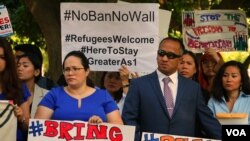Cambodia’s immigration department has confirmed that about 70 Cambodians living in the U.S. are set to be deported in December, immigration advocates say.
The Southeast Asia Resource Action Center (SEARAC) in a statement Wednesday said the move is “likely” to happen in two “batches,” and the first group will be removed before the holidays.
“We condemn the deportation of refugees and the separation of families. This heartless move by both the U.S. and Cambodian governments to terrorize people right before the holidays is deplorable,” Quyen Dinh, SEARAC’s executive director, said.
As VOA has previously reported, many Cambodians who survived the Khmer Rouge regime suffer from post-traumatic stress disorder. This has complicated their integration into American life.
“War and genocide had caused so much damage to the families,” Chum Bun Rong, Cambodia’s ambassador to the United States, told VOA. “They continued to struggle on [U.S.] soil, and dealing with trauma might cause people to commit crimes.”
A U.S. Immigration Customs and Enforcement (ICE) official told VOA that for policy and security reasons, the agency does not comment on planned operations until they have been completed.
SEARAC reports that at least 200 people are expected to be removed in 2018.
“This group of 200 will be the largest group to ever be deported in one year in both U.S. and Cambodian history,” the statement said.
ICE told VOA there are more than 1,900 Cambodian nationals residing in the United States who are subject to a final order of removal, of whom 1,412 have criminal convictions.
Repatriation agreement
Wednesday, Cambodian Prime Minister Hun Sen said in a speech in Phnom Penh, Cambodia's capital, that he welcomes the “brothers and sisters” home, according to the Phnom Penh Post.
“We have an agreement with the U.S., and we need to follow it. … For us, we thought about humanitarian issues and human rights, but we have not changed anything to not follow the agreement,” Hun Sen said, which the paper reported was “largely brushing aside his own previous scathing comments about the repatriation program.”
Although both countries negotiated a deportation agreement in 2002, Cambodia has a history of not taking its nationals back, making it a “recalcitrant” country, which has left many detainees in a legal limbo since they did not know whether they would be removed from the U.S. Since 2002, roughly 500 Cambodians have been repatriated.
The Department of Homeland Security announced in early September that it was placing sanctions on Cambodia. Specifically, DHS said it was denying visas to Cambodian Ministry of Foreign Affairs officials and their families.
In October, the ministry asked U.S. Embassy officials in Phnom Penh to temporarily suspend the 2002 repatriation agreement in an attempt to amend it.
While not answering specific questions, a State Department spokesperson said the U.S. will continue to work with Cambodia on repatriation of its citizens. The official added that the U.S. “believes that each country has an obligation under international law to accept the return of its nationals who are not eligible to remain in the United States or any other country.”
Court case
In early November, the Asian Americans Advancing Justice-Asian Law Caucus and the Asian Americans Advancing Justice-Los Angeles filed a nationwide class action lawsuit challenging the Cambodian arrests.
They argue that people detained in the raids arrived in the United States as refugee children fleeing the Khmer Rouge in Cambodia, and many of them have never traveled back to Cambodia.
“The bottom line,” the ICE official countered, “is that any alien removed no longer had any lawful status to remain in the United States.”
“International law obligates each country to accept the return of its nationals ordered removed from the United States,” Brendan Raedy, an ICE spokesman, told VOA in a statement.
“The United States itself routinely cooperates with foreign governments in documenting and accepting its citizens when asked, as do the majority of countries in the world,” Raedy said.
NPR reports that Immigration advocates say roundups and deportations are part of a “larger diplomatic quarrel between” the U.S. and Cambodia.
“We think that the raids are part of this escalation of pressure on countries to take their nationals back and the people detained are sort of being used as a bargaining chip,” Jenny Zhao, a staff attorney with Asian Americans Advancing Justice-Asian Law Caucus, told the network.




